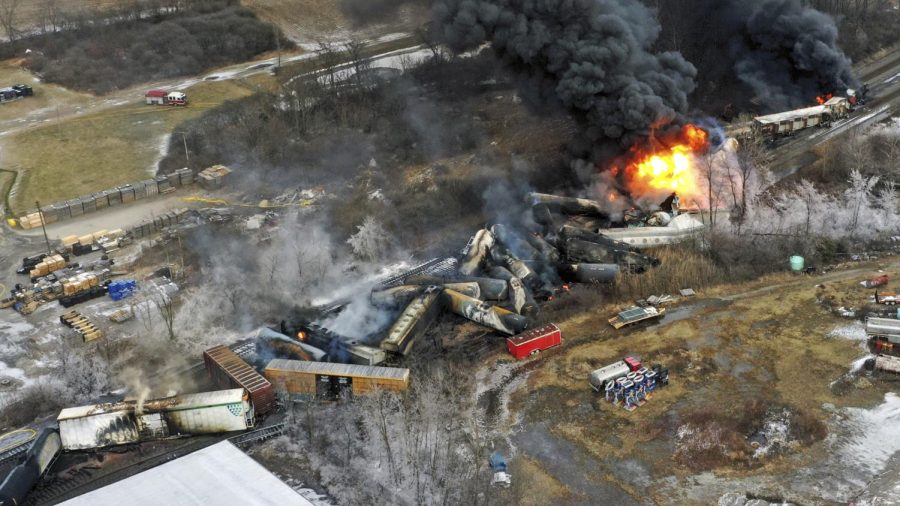Opinion | Response to Ohio train derailment reminds us that government, companies treat life as expendable
This photo taken with a drone shows portions of a Norfolk Southern freight train that derailed Friday night in East Palestine, Ohio are still on fire at midday Saturday, Feb. 4, 2023.
February 28, 2023
Nearly a month after the train derailment disaster, residents of East Palestine are experiencing skin rashes, headaches and severe irritation of the lungs and eyes. These symptoms persist despite the Environmental Protection Agency’s reassurance that the levels of toxins in the air are safe and habitable in the Ohio area.
However, research from Texas A&M University found evidence contradicting the EPA’s assurances. Although concentrations weren’t found at extreme levels, pollutant chemicals are still present in the atmosphere. Texas A&M’s study predicted that if the levels of hazardous toxins remain the same for an uncertain amount of time — either in the next few months or years — citizens may be at risk for long-term detrimental health effects, yet the full scope of what those detriments could consist of is unknown. However, the EPA claims that the elevated levels will not remain at that level for “anywhere near that long.”
To avoid a catastrophic explosion, authorities created a controlled explosion from the vinyl chloride gas to prevent further contamination and potential massive explosion. Although authorities considered the controlled explosion the lesser of two evils, it does not innately mean it was a safe option.
One citizen, who lives 400 miles away from East Palestine, posted a TikTok claiming that acid rain from the chemical release damaged her car. In response to this disaster and its effects, there have been incidents of alleged fearmongering on TikTok that acid rain will become a countrywide issue as a result of the incident, but experts have apparently debunked these claims. Despite the uncertainty and conflicting accounts of this disaster, one aspect remains certain — people are scared.
Even though the EPA reported that the levels of toxins are safe and the acid rain theory was “debunked,” citizens are still concerned about contaminated groundwater. Norfolk Southern, the transportation company that owned the derailed train, claimed that 15,000 pounds of soil and more than one million gallons of water were contaminated and removed from the area, but didn’t elaborate on the specific toxins. Norfolk Southern is now seemingly taking charge of the decontamination and clean-up, as the EPA is demanding. Biden posted on Twitter, “This is their mess. They should clean it up.”
Although Norfolk Southern is primarily responsible for their actions, I believe the government has a duty to help protect its constituents. It should not hedge responsibility solely back to Norfolk Southern. The well-being of the country should be a government priority, and it should do all in its power to ensure the safety of all citizens, regardless of whether the government was the one to cause the incident.
“If it’s safe and habitable, then why does it hurt?” said Ohio resident Nathan Velez in a CNN interview. “Why does it hurt me to breathe?” Other residents were diagnosed with bronchitis since the train derailment, along with other symptoms of chemical exposure.
One of the chemicals transported on the Norfolk Southern train was vinyl chloride, the most reported chemical of the train derailment. Airgas’s Safety Data Sheet on vinyl chloride says it may cause organ failure and it’s likely carcinogenic. Vinyl chloride attacks the internal system, especially the liver.
Among vinyl chloride, other chemicals that weren’t originally reported like ethylhexyl acrylate, isobutylene and ethylene glycol monobutyl were on Norfolk Southern’s derailed train. Ethylhexyl acrylate and ethylene glycol monobutyl are strong irritants. Isobutylene can cause genetic defects along with cancer.
No one can hide the disastrous effects this catastrophe caused, not only to the homes and health of East Palestine citizens, but to the environment and wildlife. A recorded 3,500 dead fish were piled along the banks of Ohio rivers and other waterways. This data doesn’t include the other dead or suffering Ohio pets.
Along with the conflicting evidence of safe air and water quality levels, former President Donald Trump revoked Obama’s 2015 regulation, which stated that advanced braking technology was required for trains transporting hazardous chemicals. Trump’s department of transportation claimed the cost for the brakes would outweigh the benefit.
Government response has been a mixed basket at best. But, we shouldn’t look to politicians for scientific explanations about safety, anyhow. They’re not the experts and will do anything they can to stave off public hysteria. Take the Three Mile Island nuclear accident in 1979, which became a turning point for public distrust and fear. The Nuclear Regulatory Commission increased regulations and safety precautions after this accident.
Why does it require a catastrophe to force our government to listen? We’re deplorably unprepared for what’s about to come — and there will be other disasters like this in the future or ones that are astronomically worse. With climate change leading us further to the brink of destruction, environmental and human protection is needed now more than ever.
Norfolk Southern representatives refused to attend East Palestine’s town hall meeting after the wake of their caused destruction, leaving citizens demanding answers. Companies like Norfolk Southern prioritize damage control over doing what’s morally right — taking accountability.
While Norfolk Southern and government officials reveled in the safety of their unaffected areas, Ohio citizens were displaced from their homes with little support or guidance, leaving many seeking answers.
The issues of environmental and public health disasters are not going to fade away. Unless we demand accountability from our government and the companies responsible, they will continue to treat all life as expendable.
Lynnette Tibbott primarily writes about topics in the sciences and humanities. Write to her at [email protected].









